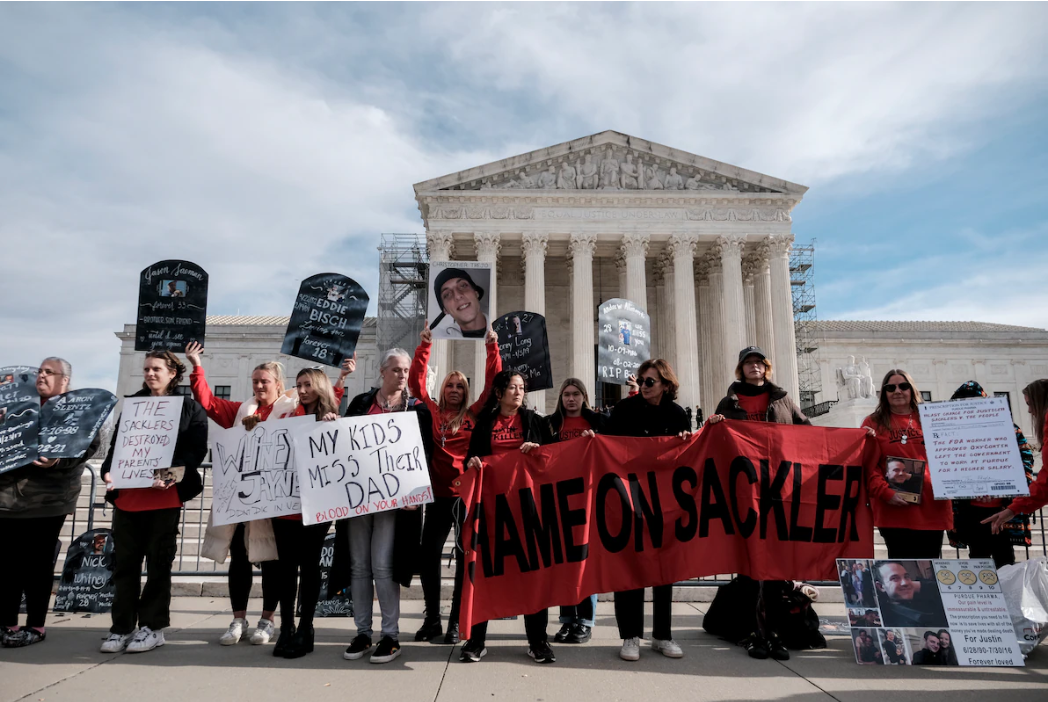(The Washington Post) A divided Supreme Court on Thursday blocked a controversial proposed Purdue Pharma bankruptcy plan that would have provided billions of dollars to help address the nation’s opioid crisis in exchange for protecting the family that owns the company from future lawsuits.
The justices ruled that U.S. bankruptcy code does not allow a court to shield the Sackler family, which owns the company and had agreed to pay up to $6 billion over 18 years as part of the plan, from future opioid lawsuits. Family members did not file for bankruptcy themselves.
The ruling means states and other parties suing Purdue will restart negotiations, the latest chapter in the national reckoning over the role of drugmakers and other companies in igniting the epidemic of addiction and overdoses. The ruling could also affect major settlements in other cases approved through bankruptcy courts.
In a 5-4 decision that scrambled ideological lines on the Supreme Court, the majority found the plan was invalid because all the affected parties had not been consulted on the deal.
Justice Neil M. Gorsuch, writing for the majority, concluded that the bankruptcy code does not allow parties who did not file for bankruptcy to be shielded from lawsuits by claimants who did not consent.
“No one has directed us to a statute or case suggesting American courts in the past enjoyed the power in bankruptcy to discharge [such] claims … all without the consent of those affected,” wrote Gorsuch, who was joined by Justices Samuel A. Alito Jr., Clarence Thomas, Ketanji Brown Jackson, and Amy Coney Barrett.
Gorsuch said Congress possesses the ability to overhaul the bankruptcy code in a way that would explicitly address opioid-related bankruptcies.
Purdue declared bankruptcy in 2019, as it faced thousands of lawsuits and allegations that the company helped fuel the crisis by the marketing of its blockbuster painkiller OxyContin.
The Office of the U.S. Trustee, a branch of the Justice Department, challenged the bankruptcy deal, saying it violated federal law. The legal issue before the Supreme Court in Harrington v. Purdue Pharma was whether, according to federal bankruptcy laws, the Sacklers could be shielded from future opioid-related litigation filed by those who do not consent to give up their rights to sue.
End of carousel
A panel of the U.S. Court of Appeals for the 2nd Circuit in New York said yes, citing two provisions of the bankruptcy code. One says a bankruptcy court “may issue any order, process, or judgment that is necessary or appropriate to carry out the provisions of” the law. The other says a plan may “include any other appropriate provision not inconsistent with the applicable provisions of” the code.
The appeals court interpreted that to mean a bankruptcy court could approve provisions not expressly forbidden by the code. In August, the Supreme Court put the bankruptcy deal on hold to consider the 2nd Circuit’s ruling.
Justice Brett M. Kavanaugh, writing for the minority that included conservative justice John G. Roberts Jr. and liberal justices Sonia Sotomayor and Elena Kagan, said Thursday’s decision “is wrong on the law and devastating for more than 100,000 opioid victims and their families.” He wrote the decision restricts “the long-established authority of bankruptcy courts to fashion fair and equitable relief for mass-tort victims.”
Purdue Pharma, in a statement, called the decision “heart crushing” because so many creditors supported the deal. “The decision does nothing to deter us from the twin goals of using settlement dollars for opioid abatement and turning the company into an engine for good,” the company said in a statement.


